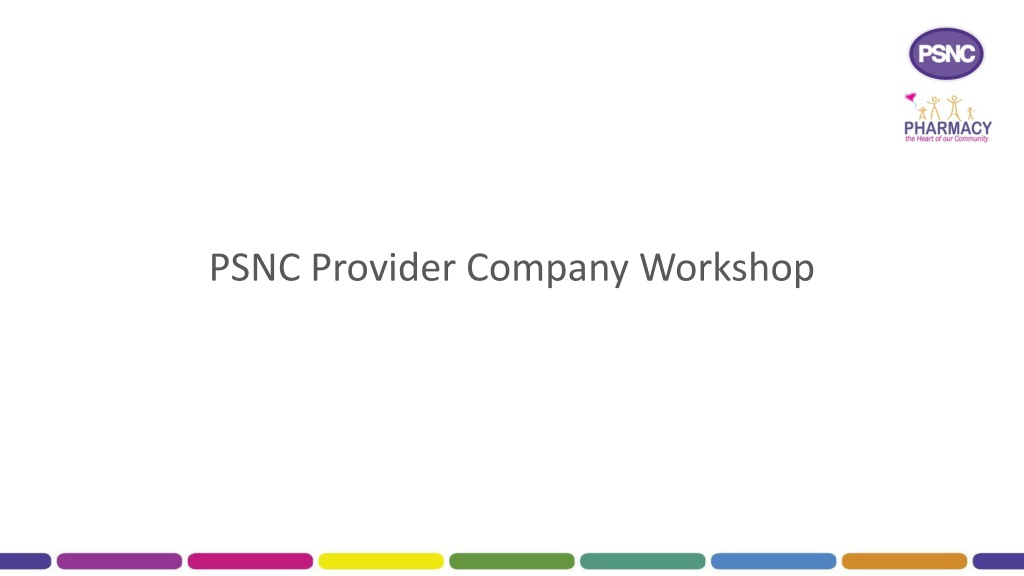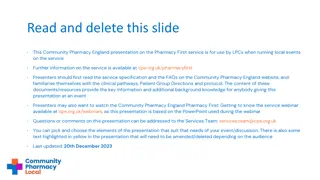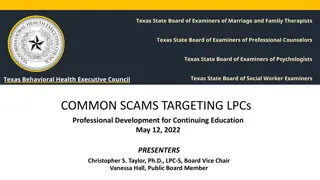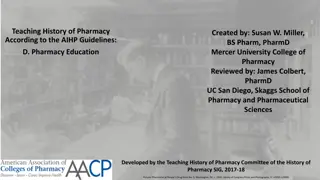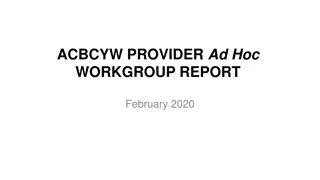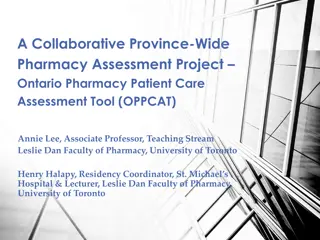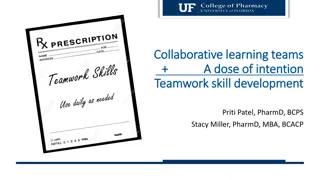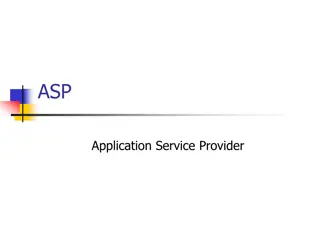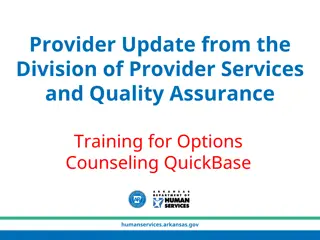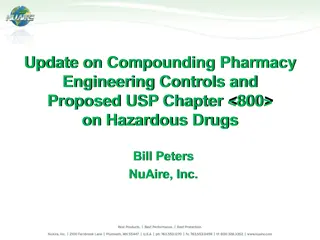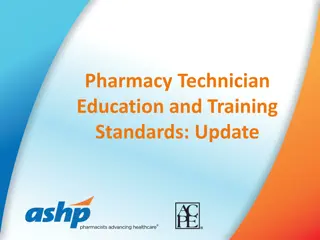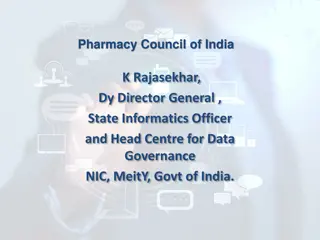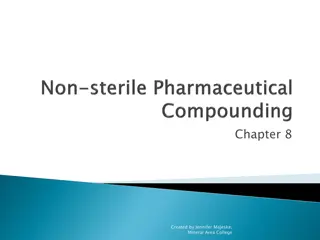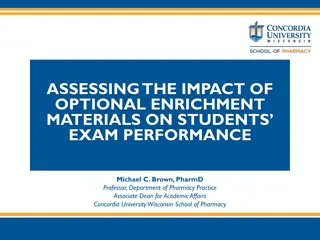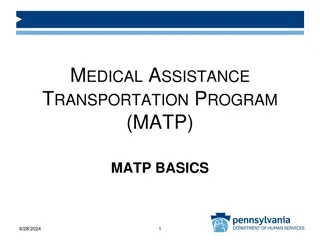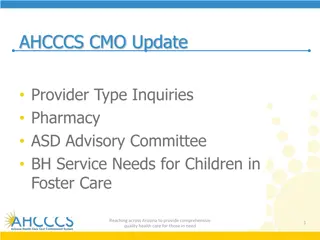Understanding the Role of Provider Companies and LPCs in Pharmacy Services
Explore the importance of setting up a provider company in the pharmacy sector, the evolving role of Local Pharmaceutical Committees (LPCs), and how they support contractors and the delivery of services. Learn about the challenges, benefits, and options available to contractors in shaping the future of pharmacy services.
Download Presentation

Please find below an Image/Link to download the presentation.
The content on the website is provided AS IS for your information and personal use only. It may not be sold, licensed, or shared on other websites without obtaining consent from the author. Download presentation by click this link. If you encounter any issues during the download, it is possible that the publisher has removed the file from their server.
E N D
Presentation Transcript
This morning Welcome, introduction and the revised Model Articles Gordon Hockey Director of Operations and Support, PSNC Setting up a provider company set up Putting the pieces together Paul Nightingale Independent Business Consultant Coffee Break Running a successful provider company Avon LPC case study Richard Brown Chief Officer, Avon LPC Supporting contractors Community Pharmacy West Yorkshire case study Ruth Buchan Chief Executive Officer, Community Pharmacy West Yorkshire Q&A Gordon Hockey, Paul Nightingale, Richard Brown and Ruth Buchan
Introduction and Model Articles Why have a provider company The role of the LPC Problems of existing provider companies Changes introduced by the new Model Articles Liability, op safeguards and existing provider companies Model Rules What continues to be an issue
Why have a provider company? Commissioners may want to use a single point provider so they do not have to contract with each pharmacy/contractor in the region or assure delivery of services to save admin/costs Emerging NHS structures including Primary Care Networks and the GP 5-year contract may require local cooperation to commission and provide local services Role of the LPC is limited
LPC role A group of contractors decide their LPC is not meeting their needs and are considering starting their own LPC or joining a neighbouring LPC. Some contractors do not want to belong to any LPC. You are due to meet them. What might be their dissatisfaction with the LPC? What are their options? What will you say?
LPC Role NHS Act 2016 LPC Model Constitution Increasing role of support
The role of the LPC LPCs are not providers of NHS services LPCs cannot both represent/advise/support contractors and assure quality/delivery of services But LPCs can use levy income in accordance with the NHS Act 2006 and PSNC model constitution including a start up loan LPCs can develop new services (PSNC guidance) and support contractors to meet service specifications (e.g. CPCS and PQS)
Summary Activity Provider Company LPC Tender for and deliver services Yes No Monitor and performance manage service provision Yes No Use levy income to develop new services for contractors N/A Yes Use levy income to represent and support contractors N/A Yes Must be a member No Yes
Basic company structure Members - own the company and might pay a membership fee and in a limited company have limited liability Directors legal responsibility for running the company and potentially unlimited liability Board of directors run the company Incorporation - company must have Articles of Association setting legally binding rules between company and members and a Memorandum which records the setting up of the company
Problems with the previous Model Articles 1. Not all CCA, AIM and Independents are members or engaged with the provider company 2. Decisions at Board level do not recognise operational issues for larger contractors 3. Costly to run with large memberships and annual general meetings 4. Perceived lack of accountability of some provider companies
The Model Articles and membership structure 1. LPC and Non-LPC members, directors and a board of the company; provision for the Board to agree Rules 2. New LPC members accepted if all LPC Directors agree and a majority of the non-LPC directors 3. Non-LPC members of the company i.e. contractors in the region apply and may be accepted by the Board 4. New structure reduced numbers of (full) members - one for each sub-region and affiliate membership for other contractors*
The Model Articles and ops and accountability 5. Each LPC member may appoint an LPC director 6. Where more LPCs involved a new scrutiny and oversight committee may appoint LPC directors* 7. Observers to the board e.g. a CCA company employee to assist decision-making and ensure larger corporate engaged details of criteria for selection in the rules 8. LPC scrutiny and oversight committee can provide additional accountability of the provider company to contractors
The Model Articles and admin costs 9. Alternative funding operating costs of the company funded through top-slicing of services fees all contractors receive the same fee for providing a service 10.Reduced running costs smaller (full) membership base*, fewer AGMs* and no annual collection of fees and a part-time manager 11.Alternate directors provisions removed* 12.Board may appoint non-LPC directors (not AGMs)* 13.Expulsion of any member is subject to an external appeal process*
What is the structure? Who Articles Total Board Director LPC Member 1 from each LPC or appointed by O&S X Yes all X Non-LPC Member 1 from each region Decided by Board If appointed total (X +1) Affiliate Member Any contractor (other than a non- LPC Member) All LPC contractors (other than a non-LPC Member) No Observer One from a CCA or AIM company Decided by Board No
Liability Person Role Liability LPC Member Limited liability by share 1 LPC Director Potentially unlimited Non-LPC Member Limited liability by share 1 Non-LPC Director (as well as Member) Potentially unlimited All other contractors Affiliate Members None One from CCA, AIM, PSNC Observer None
Operational safeguards Limited liability company Insurance provision for company and directors and officers Engage a secretary governance and manager - business Don t tender for services that you cannot deliver Allocate income to run the company Comply with company and competition law
Revisions to an existing provider company Articles difficult to vary; Rules easier to change as agreed by the Board Many of the proposed changes likely to be possible by amendment of the Rules e.g. Observers, changed funding, Oversight and Scrutiny Committee Some changes are not possible or desired e.g. Reducing membership
Rules - purpose Any trading or other activity that support members mutual or non-mutual activities Seek to provide services identified and specified by member LPCs May liaise with the NHS and associated organisations May provide services on a not-for-profit basis
Rules - membership To provide services a contractor must be a member (member or affiliate member) Affiliate members must agree to comply with the Articles and Rules Conflict of interest not to use information gained through the company for personal/own business use (also provisions in the Articles) If conflicted on one project, may still provide other services through the provider company
Rules various Manager for day-to-day operations Board meeting and AGM meeting admin and procedures Observers draft An Observer may be an employee of a member of the Company Chemists Association or an employee of a member of the Association of Multiple Chemists or a representative of the PSNC; or any other person whose contribution the directors consider will benefit the purposes and business of the Company.
Rules - various Seek good relationships with and respond to complaints from commissioners/LPCs/Scrutiny and Oversight Committee Provide evidence of compliance with the service specification if requested by commissioners/Scrutiny and Oversight Comm Records, claims and payment Membership duties e.g. payment provisions and reclaiming overpayments
What continues to be an issue? No commissioner has to commission local services the task of showing the value and readiness to deliver services remains a task for the LPC as well as the provider company No contractor has to provide services at the agreed fee, unless it has agreed to do so this cannot be assumed from membership or affiliate membership Operational issues for the provider company
